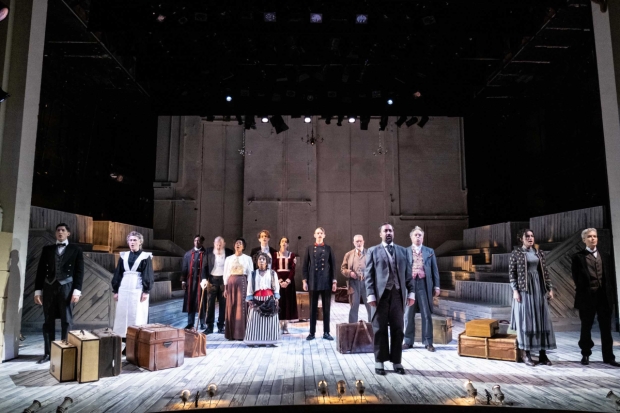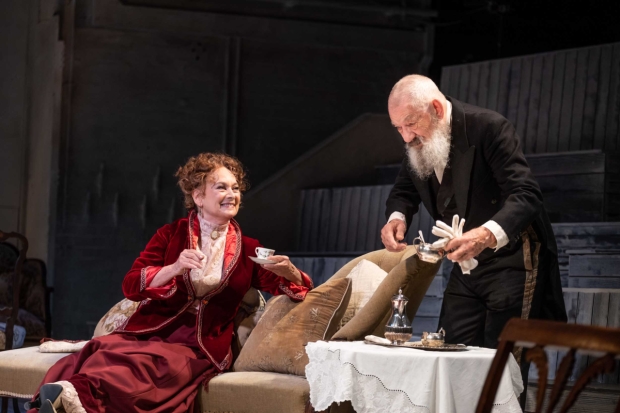The Cherry Orchard review – Ian McKellen performs with poignant care in this deft revival

© Jack Merriman
Back in 1998, when McKellen played Dr Dorn in The Seagull in an earlier repertory company, at the Courtyard, based at the West Yorkshire Playhouse in Leeds, he wrote "Although (director) Jude Kelly expected me to play two leading parts in our season of three plays, I wanted to make my debut with the Courtyard Company in a play which would bind the new troupe together and show us off as an integrated ensemble". He described Dorn as "a wonderful part", and having enthusiastically made the trip to Leeds, admittedly drawn there to see one of my idols, I have to agree.
The idea of setting up a repertory company at the Theatre Royal Windsor with Ian McKellen at its heart came from director Sean Mathias and it would be disingenuous not to admit the justly beloved theatrical knight is the main draw. For this second production from an ensemble, most of whom played together in the production of Hamlet where McKellen took the title role, he takes one of the smallest, least wordy and showy roles, Firs, the ancient retainer of the household of Ranyevskaya, whose estate includes the eponymous Cherry Orchard.
This is generous almost to a fault, and sometimes, I ached to more closely engage with the poignantly careful ministrations of this caring, stooped, be-whiskered, figure, almost (but happily not quite) in danger of being swallowed up in the melée of personalities in Ranyevskaya's busy household. He takes centre-stage only in the striking image he presents at the play's end, a still and silent figure, alone and unconscious on an otherwise empty stage.
But I'm getting ahead of myself. The company is, I think, cohesive here, building on working together for many months now; and there is so much to admire in their performances. That the storytelling is sometimes confused and confusing is more down to Chekov than to director Sean Mathias.

© Jack Merriman
A spacious floor of bare beech-coloured boards scattered with strategically placed elegant though shabby furniture and rugs (company designer Lee Newby) evokes a spacious homely family nursery and as necessary the ballroom and even a field, the eponymous orchard a distant mirage. It is perhaps best suggested by the lush cherry-red gown in which Francesca Annis' Ranevskaya makes her much anticipated return from five years in Paris, where she had retired, seeking consolation for the loss of her little son in a drowning accident.
Around her swirl the denizens of the estate she has neglected; those who have an interest in its fortunes reveal their own hopes and fears and of course their personalities and relationships. In many ways the storytelling is shared. Together they make it apparent that the central reality Ranevskaya must face is that the estate's finances are in dire trouble. Her more successful neighbour, hard-boiled landowner Lopakhin, suggests that at least part of the estate – the beloved cherry orchard – should be sold to repay her debts.
Annis's Ranevskaya (a shadowy figure as the ghost in Hamlet) glows and glimmers despite her predicament. She is well matched by Martin Shaw (new to the company) as the brutally realistic Lopakhin – a nascent property dealer with strikingly contemporary strategies. Missy Malek (who made so much of the small role of Osric in Hamlet) shows an affecting depth as Ranevskaya's conflicted daughter Anya. Kezrena James (also making her company debut) as Varya, Ranyevskaya's adopted daughter, vividly portrays the young woman who rises to the challenge of running the household in her mother's absence, subsuming her own needs and desires for freedom. That she finds herself in this position is partly down to the inept management of Gaev, Ranevskaya's ineffectual brother. Jenny Seagrove, swapping the green gown she wore as Gertrude for man's attire and sporting a moustache, cuts a striking figure. I think even Stanislavski who played this role himself in the 1920s, would accept and even admire her convincing portrayal of a chilly, disappointed man, turning inward and preoccupied by the billiard game that is more obsession than hobby.
Alis Wyn Davis (a wistful musical delight as Ophelia) shows her mettle as Dunyasha, a chambermaid so feisty that she punches far above her weight in the household, effortlessly assuming a rather higher status than her job title would suggest. And as Charlotta Ivanovna, the Governess, Alison Halstead (Player and Gravedigger in Hamlet) is deliciously disturbing and attention-grabbing as she displays her showmanship with magic tricks that transfix both household and audience.
Ben Allen (a warm and faithful Horatio to McKellen's Hamlet), gives a vibrant account of Trofimov the penniless student who was tutor to Ranevskaya's late son. Still eking out an existence on the estate's edge, he nevertheless engages with its household, especially the women, rather than his studies.
I could go on extolling the deft portrayals of every character by every member of a company that has no weak link. Returning to McKellen, his generosity in not taking centre-stage does pay off with spades. So I will indeed call out Chekov himself, rather than Mathias and deft adaptor Martin Sherman, for an impression of confused and confusing storytelling.










